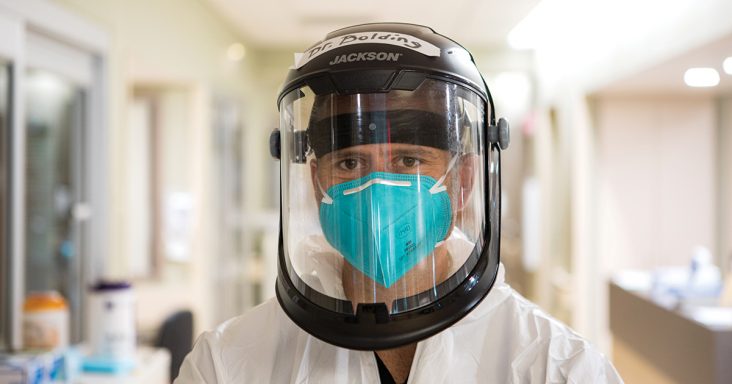Year in Review: The Top 10 business stories that shaped 2020 in Northwest Arkansas
by January 7, 2021 10:54 am 2,066 views

Dr. Michael Bolding, a hospitalist at Washington Regional Medical Center in Fayetteville, has been on the front line of the fight against COVID-19.
Before we say goodbye to 2020 and usher in 2021, as has become the tradition in our first issue of January, the Northwest Arkansas Business Journal staff has put together a list of what we consider the past 12 months’ 10 biggest business stories.
It’s always a tall task, and which stories are the biggest is up for discussion. But we’re sure you’ll agree there was plenty to talk about in 2020.
1. COVID-19
The ongoing COVID-19 pandemic and the loss of lives, jobs and commerce was the prominent story of 2020.
In the second week of March, the World Health Organization classified COVID-19 as a pandemic. Arkansas’ first virus case was reported March 11 in Pine Bluff. The city of Fayetteville confirmed the first case in Northwest Arkansas one week later.
Since then, the challenges presented by the global pandemic were numerous — for healthcare providers, schools, restaurants, financial institutions and businesses large and small.
To help stem the impact of the deadly virus, Northwest Arkansas healthcare providers — in collaboration with the Northwest Arkansas Council, other community officials and regional leaders — launched a campaign called “Safe and Strong.” The core message is to persuade people that social distancing, surface cleanliness, personal hygiene and wearing a face covering can prevent further community spread of the virus and keep hospital capacity from becoming strained.
In April, Gov. Asa Hutchinson extended the mandatory closure of all Arkansas public schools through the remainder of the 2019-20 school year. Educators continued providing alternative methods of instruction.
From a commerce perspective, no enterprise escaped the collateral damage of COVID-19. Employers took different and creative approaches to blunt the impact of sharp business decline as best they could.
Federal, state and local officials rolled out a patchwork of grants and loans during the year to help businesses survive temporary closures and loss of customers.
2. UA RESEARCH GRANT
In July, the Walton Family Charitable Support Foundation announced a $194.7 million donation to the University of Arkansas. The donation is one of the most significant single private gifts ever given to a university for advancing research and economic development.
The Walton Family Charitable Support Foundation supports education and community initiatives in Arkansas, Kansas, Missouri, Oklahoma and Texas. The five-year grant will grow the university’s research engine and drive commercialization and entrepreneurship education.
The grant will strengthen the university’s research initiatives and, among other things, support the construction of a new research facility on the Fayetteville campus. It’s called the University of Arkansas Institute for Integrative and Innovative Research (I3R). Chancellor Joe Steinmetz described the building as an interdisciplinary and wholly integrative research institute.
The grant is the second phase of funding by the foundation to the UA focused on research and commercialization efforts. The Phase I grant, $23.7 million, was announced in November 2018.
A funding overview indicated a portion of the Phase II grant will establish a UA physical presence in Bentonville. A campus in Benton County is subject to approval by the UA System Board of Trustees and appropriate accrediting agencies.
3. HOUSING MARKET STRENGTH
Residential real estate is an essential driver in the regional economy. Put to the test by one of the most substantial economic downturns in decades — caused by a global pandemic not seen in a century — Northwest Arkansas’ housing market showed remarkable resilience.
Low inventory and low interest rates certainly helped.
Through June 2020, homes sold in Benton and Washington counties combined were up nearly 6% from the same period of 2019. Through September, while the COVID-19 pandemic raged, that number jumped up to 10%.
Consistent with the peculiar year, unusually high home sales continued in the fall and winter months, where they typically trend downward. According to the Northwest Arkansas Board of Realtors’ latest data, home sales in Northwest Arkansas were up nearly 30% in November 2020.
Year-to-date through the first 11 months, there were 10,971 homes sold in the two-county area, up 12.4% from 9,759 homes sold during the same period of 2019.
Carrying that momentum into 2021 seems likely because of the strong in-migration of new residents, faster local job market recoveries and environments conducive to work-from-home arrangements.
Mortgage rates continue their historic decline, too. In December, the 30-year fixed rate fell to an all-time low of 2.67%.
4. ISSUE 1 PASSES
Voters approved to permanently extend a half-cent sales tax for road projects that is expected to support multiple projects in Northwest Arkansas.
Issue 1 was approved Nov. 3 with 55% of the vote and will extend indefinitely the state’s half-cent sales tax that was set to expire in 2023. Voters initially approved the tax in 2012. Approval of Issue 1 was a top priority for Gov. Asa Hutchinson as it was a key component of his $300 million highway plan.
Under the plan, the Arkansas Department of Transportation could improve 7,300 of the 7,900 miles of Arkansas highways that carry 90% of statewide traffic daily. About three-quarters of the funding from the tax will be dedicated to maintain existing roads. The remainder will go toward capital and congestion relief.
Statewide, the taxpayer money will support 50 proposed projects. In Northwest Arkansas, they include the connector road to the Northwest Arkansas National Airport, two additional segments of the U.S. Highway 412 bypass and the widening of Arkansas Highway 112, between Fayetteville and Bentonville. In the Fort Smith area, one of the proposed projects is a two-lane segment to extend Interstate 49, between Interstate 40 in Alma and Arkansas Highway 22 in Barling.
5. WHOLE HEALTH INSTITUTE
Alice Walton, billionaire philanthropist and Walmart heir, announced in January the formation of healthcare organization Whole Health Institute in Bentonville.
It will focus on improving health regionally and across the state and is expected to have a nationwide impact on healthcare.

“We need a holistic approach that incorporates mind, body and spirit,” Walton said in January. “Whole health tools do exist around the country, and we want to be part of the solution to change healthcare.
“The U.S. is 37th in the world for life expectancy, and we spend way more than other countries who have much better outcomes,” Walton added.
She named Dr. Tracy Gaudet as the institute’s executive director. Gaudet previously served as the executive director of the Veterans Health Administration’s Office of Patient Centered Care and Cultural Transformation. Other members of the institute’s executive team include Dr. Amanda Hull, director of Whole Health delivery systems, and Dr. James Marzolf, director of health sector finance and policy. Jordan Carlisle, who resigned from the Greater Bentonville Area Chamber of Commerce, accepted the role of director of technology for the institute.
In December, Crystal Bridges Museum of American Art announced the institute would be built on the museum’s 120-acre grounds in Bentonville. Construction of the 75,000-square-foot building is expected to be completed in 2023.
6. TYSON TURNOVER
In August, Springdale-based meat giant Tyson Foods Inc. announced Dean Banks would replace Noel White as CEO. The move was effective Oct. 3.
Banks retained his title of president, and White remained with Tyson Foods in a new role as executive vice chairman of the board of directors.
Banks was raised in southwest Ohio, served in the U.S. Marine Corps, and earned an MBA from Harvard University. He’s been president of Tyson Foods since December 2019 and joined the company’s board of directors in 2017. He’s the company’s third CEO since Donnie Smith retired in November 2016.
Before joining the company, Banks was on the leadership team of X (formerly Google [x]), an Alphabet Inc. company. Previously, he was managing partner of SEED Ventures, a group investing in and developing early-stage healthcare technologies. He spent several years in life sciences, genetic engineering and orthopedics and medical devices. This led him into early stage-innovation and to his passion for technology from a business perspective.
Banks was promoted to CEO amid controversy during the pandemic. Tyson Foods was sued by several of the families of employees who died from COVID-19. The company fired seven management employees at its pork plant in Waterloo, Iowa, after allegations surfaced regarding a betting pool for supervisors and managers to wager how many plant employees would get COVID.
7. WALMART MAKES WAVES
Bentonville-based retailer Walmart Inc. let go of hundreds of corporate employees, hosted its first virtual shareholder’s meeting and acquired a share of the social media site TikTok in 2020.
In July, Walmart laid off hundreds of employees in Northwest Arkansas and West Coast offices amid the restructuring of its U.S. business. Losses within the company’s e-commerce division have led to job cuts with dozens of category specialists and analysts laid off. Jobs were also cut in the areas of fresh produce and meat supply chain, real estate, logistics and transportation, global people, human resources and customer experience.
Walmart will continue to pay anyone laid off and allow them to keep their benefits through Jan. 31, 2021.
In September, Walmart tentatively agreed to purchase 7.5% of TikTok Global, a company TikTok created to provide its services to users in the United States and internationally. Walmart will provide its e-commerce, fulfillment, payments and other omnichannel services to TikTok Global. Walmart CEO Doug McMillon will serve as one of five board members of the new company.
In June, the retailer hosted its shareholder’s meeting virtually instead of hosting multiple events as a precaution amid the COVID-19 pandemic. Walmart usually hosts a week of events for shareholders, including a business meeting and employee celebration for 5,000 employees from across the globe.
8. PUBLIC PROFITABILITY
Profits continued to rise for most public companies in Northwest Arkansas in the wake of COVID-19 and the related economic downturn.
Bentonville-based retailer Walmart, Springdale-based meat producer Tyson Foods and Lowell-based carrier J.B. Hunt Transport Services are among those that remained profitable this year.
Bolstered by strong e-commerce sales, Walmart’s net income rose 45.3% to $15.6 billion through the third quarter that ended Oct. 31, from $10.74 billion in the same period last fiscal year.
Tyson’s net income rose 5.9% to $2.14 billion in the fiscal year that ended Oct. 3, from $2.02 billion in the previous fiscal year.
Through three quarters, J.B. Hunt’s earnings have fallen 12.9% to $352.02 million, from $404.45 million in the same period in 2019.
Over the same period, Fort Smith-based ArcBest, the parent company of less-than-truckload carrier ABF Freight, reported net income rose 3.6% to $47.18 million, from $45.53 million.
Through two quarters ending Oct. 31, earnings for Rogers-based America’s Car-Mart have risen by 38.7% to $40.74 million, from $29.37 million over the same period last year.
Some exceptions to a profitable year have included Tontitown-based carrier P.A.M. Transportation Services and Van Buren-based carrier USA Truck. Through three quarters, P.A.M.’s earnings have declined by 82% to $3.87 million, from $21.53 million in the same period in 2019. Over the same period, USA Truck posted a loss of $1.18 million, compared to a profit of $129,000.
9. BENTONVILLE PROJECT
Construction started in October on a 230,000-square-foot office/retail building in downtown Bentonville, known as Ledger. The principals involved describe the structure as unparalleled in Northwest Arkansas.
It’s hard to argue that contention. Consider this: The six-story building’s exterior design will incorporate a 3,900-linear-foot bikeable and walkable path. The zig-zag switchback pattern will provide direct outdoor entry on every floor, with terraces that allow for open-air access.
Josh Kyles, the Bentonville developer, says the design approach is community-centric, giving pedestrians and cyclists access to the building.
New York-based co-working giant WeWork announced the Bentonville project — to be its first in Arkansas — in April 2019 as an investment partnership with Kyles. WeWork, however, is no longer involved with the development. WeWork and Kyles’ company, Center City LLC, worked together on the project design, but the building will be operated and managed locally.
Cushman & Wakefield/Sage Partners in Rogers will lease and manage the project. It’s planned to open in early 2022.
Nabholz Construction in Rogers is overseeing the construction. Kyles, through Center City, is the landowner. He did not disclose a value for the project or additional partners with Center City. He said funding is coming from nontraditional financing and private investment.

10. DAVID GLASS DIES
Andy Wilson, a retired Walmart executive, remembers former CEO David Glass as the smartest person in the room, but who never forced his way of thinking on others.
Glass, Walmart’s CFO (1976-1984), president and COO (1984-1988) and CEO (1988-2000), died Jan. 9 of complications associated with pneumonia. He was 84.
As the retailer’s chief executive, Glass played a pivotal role in a period of extraordinary growth. Annual revenues increased from $15 billion to roughly $165 billion. Walmart’s international investments and new retail concepts like the Supercenter and Neighborhood Market also happened while Glass was CEO. Tracing the timeline, Walmart became the world’s largest retailer in 1990, the largest private employer in 1999 and the largest corporation by total sales in 2001, surpassing ExxonMobil.
“More than anyone beyond Sam Walton, David Glass is responsible for making Walmart the company it is today,” Rob Walton, Sam and Helen Walton’s son and a former board chairman, said following Glass’ death.
Following retirement from Walmart, Glass spent 20 years as owner and CEO of the Kansas City Royals. Despite mostly lean years under Glass’ ownership, the Royals made consecutive appearances in the World Series in 2014 and 2015. Kansas City won the world championship in 2015, a first for the franchise in 30 years.
